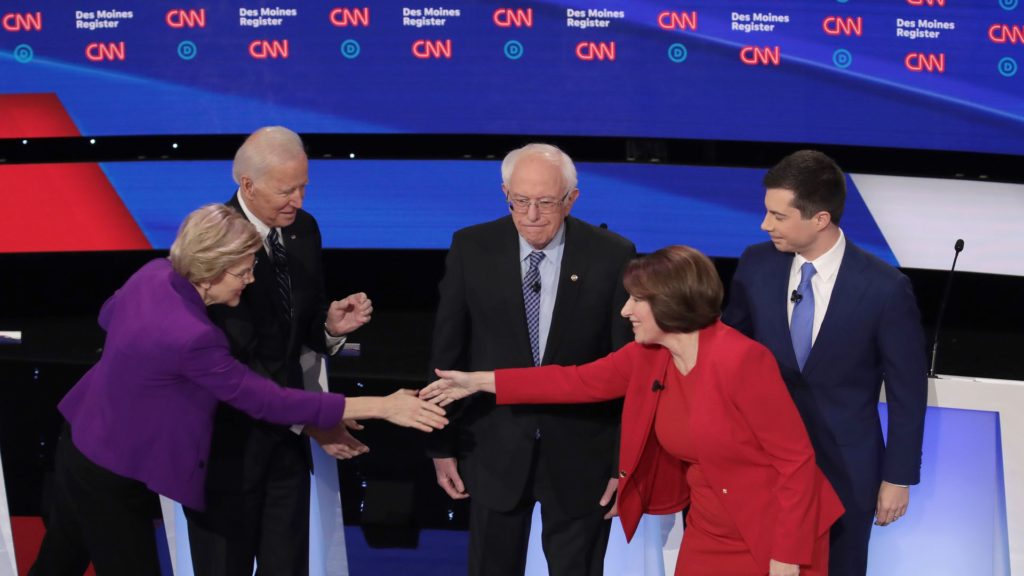Proportional Representation Primary Meets First Past the Post Election

It’s fun to deride the Iowa caucuses this year as disorganized, but the perennial complaint that they are unrepresentative of the Democratic party looms large over the “results”. (Okay the state delegate equivalents are fine, but, the raw counts are problematic to say the least). One of the challenges that has been heaped upon the Iowa and New Hampshire contests is that they occur in states that are simply unrepresentative of the United States and, by proxy, unrepresentative of the party. And, yet, the contests have produced a relative cacophony of a solid ¼ Sanders and a solid ½ of not Sanders embodied by a number of different candidates. The other ¼ could go either way.
Polling in the state of California indicate even less harmony for Super Tuesday; put another way, were California to be first, it is unclear that we would have more clarity in the contest. Though, to be fair, it is quite likely that we would have candidates like Harris and Booker stay in before Iowa; but, from a far left versus center left perspective, California appears primed to deliver an equally cacophonous outcome. A lot of this is delegate math. 272 of the 416 delegates are apportioned across the state’s 53 congressional districts which each contain between 4 and 7 delegates. So, even if a candidate is unable to make the 15% statewide threshold, there are still opportunities for candidates to emerge from California with delegates if they cross the same threshold at the congressional level. Fivethirtyeight’s modeling has Sanders at about 1/3 the delegates of California and a similar distribution across other Super Tuesday contests.
The Whac-A-Moderate strategy is a good one for Sanders as he will likely emerge as the person with the most delegates far and away above the rest of the party. The inherent contradictions of the Democratic party’s primary process – one that runs a proportional representation primary to pick candidate for a first past the post system might – might finally give way to a brokered convention.
This is not to say that the Party isn’t deciding – at least, not directly. As our colleague Scott Lemieux stated in a recent post, the Democratic party has been saying a lot without saying anything at all. The fact that the party hasn’t stepped in to attempt to galvanize support around one candidate is telling. The counterintuitive impact of this silence might actually be that when prominent members of the party decide to endorse candidates, those endorsements actually matter.
There are a number of prominent Democrats who have yet to endorse a candidate given that there are a number of well-respected members of the party running for president. At this point, members of the Democratic party ought to start thinking about endorsing a candidate and fast. It appears as though everyone is holding off to see how well Biden can do in South Carolina before making any sudden moves. By then it might be too late for the Klobuchar and perhaps the Buttigieg campaign to make significant progress in Super Tuesday states given that each – particularly Klobuchar – is dependent upon state-by-state performance for legitimacy (though, for different reasons).
Early endorsements from previous presidential rivals could be particularly effective at this stage when the contest is no longer academic. Julian Castro’s endorsement of Elizabeth Warren was no doubt helpful; one wonders if the endorsement might have been better timed later in the race to give her campaign a shot in the arm rather than have his support baked into the polls. A piece in Vox this week suggests that Hillary Clinton ought to endorse a candidate now to help facilitate support for the not-Sanders vote. Such an endorsement would likely be tectonic, particularly so for Pete Buttigieg, Mike Bloomberg, and, would matter a whole lot to Amy Klobuchar. Klobuchar has been successful in picking up newspaper endorsements and co-endorsements steadily throughout the race – no other candidate comes close. Klobuchar recently shared an endorsement from the Las Vegas Sun with Joe Biden, received an endorsement from the Mercury News & East Bay Times in California, and a strong endorsement from the Houston Chronicle. While it seems unlikely that rivals will drop out anytime soon (three of the candidates are senators of Super Tuesday states), other members of the Senate, the House, governors, and additional political figures could all make a significant difference for not-Sanders candidates now rather than two months from now.


